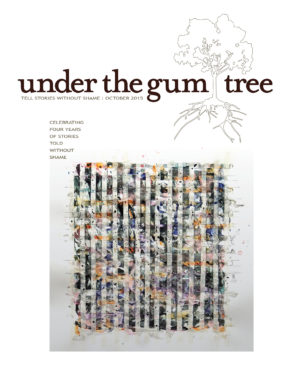Brad Guillory

Brad Guillory teaches creative writing and literature in Covington, Louisiana. He grew up in New Orleans and writes nonfiction about film and music. His work has appeared in Storyacious, The Film Journal, Brain Trust DV, and Film Fanaddict. When he is not writing, Brad also writes music with his band Push Push and spoils his children Brighton and Chloë. Brad earned an MFA in creative writing at the University of New Orleans in 2012.
When and why did you start writing? What do you enjoy most about writing and how has writing shaped other aspects of your life?
I started writing when I was about twelve years old. I just wanted to write what I felt and what I was curious about.
What inspired you to write nonfiction in a world so drawn to the sensationalism of fiction?
When I started writing nonfiction, I started opening doors that I didn’t want open, but I opened them anyway.
What topics do you often find yourself drawn to write about? Are there common themes you tend toward in all your writing?
I’m interested in the muck of the world and how it reminds me of what I like and hate about myself.
Your piece published in UTGT revolves around the idea of fear and what it motivates people to do. In what ways did you experience the community’s fears aside from your mother’s reaction?
I really didn’t. It was mainly my mother and other friend’s mothers. I remember wearing an Agnostic Front shirt that had Jesus on the cross. He has a gas mask covering his face and an American flag wrapped around his waste. A line of armed U.S. soldiers are beside Jesus. My friend’s mother saw me in the mall, and she yelled at me, “You better go home and burn that shirt.” Even then I understood the message of the image: If Jesus came back today, the government would string him up and crucify him all over again. The grown-ups didn’t get that.
Music is considered by many people to be one of the things that shape us as individuals as we are growing up. It is a deeply personal thing to listen to a song and no one ever finds the same meaning in the lyrics. How do you feel that heavy metal music influenced you at this time? Was there any truth to your mother’s concerns?
I can’t blame my mother for thinking lyrics to certain songs could be bad for me. She was reacting to what the media was telling her, just like parents in the 1950s burning their kids’ comic books. The grown-ups were scared, so they reacted. To answer your first question: all kinds of music influenced me. From Black Sabbath to the Suicidal Tendencies, I was blown away by what kids my age were listening to. I remember hearing the Buttonhole Surfers’s “22 Going on 23”; that song made the room spin because of the morbid sample and the greasy bass line and the abysmal drums and the dying guitar. Heavy Metal, punk rock, and hard core really opened me up to be saturated with all kinds of music.
Do you truly believe that the problem for your mother was the music? Or is it possible she was reacting to something else she disapproved of and the music was merely the first opportunity she found to take a stand?
My mom didn’t wanna be embarrassed. If I was walking around with a Clive Barker shirt that without a doubt predated Japanese Hentai, she would tell me to go change. I was like the young girl putting on her short skirt in the bushes around the corner from the house. I can’t blame her though; a shirt with tentacle phalluses might be pushing it.
Do you feel that this piece highlights the differences in ideologies between generations? Did those differences continue to play a role in the interactions between you and your mother after the events of this piece?
Every generation has something to push in the faces of their parents. I’m sure parents hate reading Kanye West’s lyrics as much as my mom hated reading the lyrics of the Dead Kennedys, but the lyrics for “Kill the Poor” have a message that isn’t unlike Jonathan Swift’s “A Modest Proposal” or Kanye West’s “New Slaves.”
My mother and I always fought over the strangest things, stupid things really, but she always supported my writing. No matter what I wrote–even when she thought my writing was too dark–she still loved the idea that I loved to write. She always made me feel good about writing.

